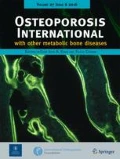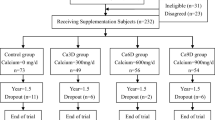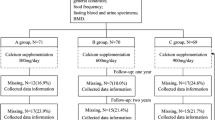Abstract
The Chinese diet is low in calcium, including among adolescent girls, with an average intake around 500 mg per day. In this study, we compared the percentage change in bone mineral density and content of the spine and hip region in a 1-year follow-up study between 104 adolescent girls aged 14 to 16 years receiving 375 ml calcium-fortified soymilk supplementation and 95 girls in the control group. The mean percentage changes of bone mineral density/content (BMD/BMC) and standard deviation (SD) at 1 year for the supplementation and control groups were as follows: neck of the femur BMD 2.7±2.94%, 1.8±3.49% (P =0.08); trochanter BMD 3.3±3.27%, 1.6±2.94% (P ≤<0.001); intertrochanter BMD 3.6±3.05%, 2.32±2.95% (P =0.002); total hip BMD 3.1±2.39%, 2.05±2.22% (P =0.001); total hip BMC 3.8±3.05%, 2.6±2.96% (P =0.006). The percent difference between the percentage of bone changes in the supplementation and control groups [100× (soymilk-control)/control] ranged from 45 to 113%. We observed no differences in the spine BMD/C and no differences in changes of height and weight between the soymilk supplementation and control groups, which yielded similar results. Stepwise multivariate regression analysis including height, weight, growth stage, dietary energy, protein, calcium from usual diet and physical activity also showed that supplementation was significantly associated with a percentage increase in BMD/C at the hip. We conclude that 375 ml calcium-fortified soymilk supplementation, or an equivalent of about two glasses, is among the effective strategies for bone acquisition and the optimization of peak bone mass in adolescent girls.

Similar content being viewed by others
References
Schwartz AV, Kelsey JL, Maggi S, Tuttleman M, Ho S C, Jonsson PV, Poor G, Sisson de Castro JA, Xu, L, Matkin CC, Nelson LM, Heyse SP (1999) International variation in the incidence of hip fractures: cross-national project on osteoporosis for the World Health Organization Program for research on aging. Osteoporosis Int 9:242–253
Ho SC, Lau EMC, Woo J, Sham A, Chan KM, Lee S, Leung PC (1999) The prevalence of osteoporosis in Hong Kong Chinese female population. Maturitas 32:171–178
Ho SC (1997) Attainment of peak bone mass and dietary factors in Chinese women. In: Lau MC, Ho SC, Leung S, Woo J (eds) Osteoporosis in Asia: crossing the frontiers. World Scientific Publishing Co PTE Ltd
Ho SC, Leung PC (1995) Determinants of peak bone mass in Chinese and Caucasian populations. HKMJ 1:38–42
Messina V, Setchell K (1994) The simple soybean and your health. Avery, New York
Messina MJ, Persky V, Setchell KDR, Barnes S (1994) Soy intake and cancer risk: a review of the in vitro and in vivo data. Nutr Cancer 21:113–121
Anderson JW, Johnstone BM, Cook-Newell ME (1995) Meta-analysis of the effects of soy protein intake on serum lipids. N Engl J Med 333:276–282
Potter SM, Baum JA, Teng H, Stillman RJ, Erdman JW Jr (1998) Soy protein and isoflavones: their effects on blood lipids and bone density in postmenopausal women. Am J Clin Nutr 68:1375S–1379S
Alekel DL, Germain AS, Peterson CT, Hanson KB, Stewart JW, Toda T (2000) Isoflavone-rich soy protein isolate attenuates bone loss in the lumbar spine of perimenopausal women. Am J Clin Nutr 72:844–852
Ho SC, Chan SG, Yi Q, Wong E (2001) Soy intake and the maintenance of peak bone mass in Hong Kong Chinese Women. J Bone Miner Res 16:1363–1369
Ho SC, Woo J, Chen YM, Sham A, Lau J (2003) Soy protein consumption and bone mineral density in early postmenopausal Chinese women. Osteoporos Int 14:835–842
Chen YM, Ho SC, Lam SSH, Ho SSS, Woo JLF (2003) Soy isoflavones have a favorable effect on bone loss in Chinese postmenopausal women with lower bone mass: a double-blind randomized-controlled trial. J Clin Endoc Metab 88:4740–4747
Anderson JJ, Chen X, Boass A, Symons M, Kohlmeier M, Renner JB, Garner SC (2002) Soy isoflavones: no effects on bone mineral content and bone mineral density in healthy, menstruating young adult women after one year. J Am Coll Nutr 21:388–393
Ho SC, Leung PC, Swaminathan R, Chan C, Chan SG, Lindsay R (1994) Determinants of bone mass in Chinese women aged 21–40. II. Pattern of dietary calcium intake and association with bone mineral density. Osteoporosis Int 4:167–175
Ho SC, Eric Wong, Chan SG, Lau J, Chan C, Leung P.C (1997) Determinants of peak bone mass in Chinese women aged 21–40 years. III. Physical activity and bone mineral density. J Bone Miner Res 12:1262–1271
McArdle WD, Katch FI, Katch VI (1981) Exercise physiology. Lea and Febiger, Philadephia, pp 486–493
Bollen AMA (2000) A prospective longitudinal study of urinary excretion of a bone resorption marker in adolescents. Ann Hum Biol 27:199–211
Lydeking-Olsen E, Jensen JEB, Setchell KDR, Damhus M, Jensen TH (2002) Isoflavone-rich soymilk prevents bone loss in the lumbar spine of postmenopausal women: a 2-year study. J Nutr 132:581S (abstract)
Petrakis N, Barnes S, King EB, Lowenstain J, Wiencke J, Lee MM, et al (1996). Stimulatory influence of soy protein isolate on breast secretion in pre- and postmenopausal women. Cancer Epidemiol Biomarkers Prev 5:785–794
Nagata C, Takatsuka N, Inaba S, Kawakami N, Shimizu H (1998) Effect of soymilk consumption on serum estrogen concentrations in premenopausal Japanese women. J Nat Cancer I 90:1830–1835
Verkasalo PK, Appleby PN, Davey GK, Key TJ (2001) Soy milk intake and plasma sex hormones: a cross-sectional study in pre- and postmenopausal women (EPIC-Oxford). Nutr Cancer 40:79–86
Anderson JJB, Miller CP (1998) Lower lifetime estrogen exposure among vegetarians as a possible risk factor for osteoporosis: a hypothesis. Vegetarian Nutr 2:4–12
Arjmandi BH, Getlinger MJ, Goyal NV, Alekel L, Hasler CM, Juma S, Drum ML, Hollis BW, Kukreja SC (1998) Role of soy protein with normal or reduced isoflavone content in reversing bone loss induced by ovarian hormone deficiency in rats. Am J Clin Nutr 68:1358S–63S
Anderson JJB, Thomsen K, Christiansen C (1987) High protein meals, insular hormones and urinary calcium excretion in human subjects. In: Christiansen C, Johansen JS, Riis BJ (eds) Osteoporosis. Nørhaven A/S, Viborg, Denmark, pp 240–245
Arjmandi BH, Khalil DA, Smith BJ, Lucas EA, Juma S, Payton ME, Wild RA (2003) Soy protein has a greater effect on bone in postmenopausal women not on hormone replacement therapy, as evidenced by reducing bone resorption and urinary calcium excretion. J Clin Endocrinol Metab 88:1048–1054
Boonen S, Lesaffre E, Dequeker J, Aerssens J, Nijs J, Pelemans W, Bouillon R (1996) Relationship between baseline insulin-like growth factor-I (IGF-I) and femoral bone density in women aged over 70 years: potential implications for the prevention of age-related bone loss. J Am Geriatr Soc 44:1301–1306
Sugimoto T, Nishiyama K, Kuribayashi F, Chihara K (1997) Serum levels of insulin-like growth factor (IGF) I, IGF-binding protein (IGFBP)-2, and IGFBP-3 in osteoporotic patients with and without spinal fractures. J Bone Miner Res 12:1272–1279
Cadogan J, Eastell R, Jones N, Barker ME (1997) Milk intake and bone mineral acquisition in adolescent girls: randomized, controlled intervention trial. BMJ 315:1255–1260
China Nutrition Association (2000) Reference dietary intake of nutrients of a Chinese population. Beijing. China Light Industry Press
Kristinsson JO, Valdimarsson O, Steingrimsdottir L, Sigurdsson G (1994). Relation between calcium intake, grip strength and bone mineral density in the forearms of girls aged 13 and 15. J Int Med 236:385–390
Lee WTK, Leung SSF, Leung DMY, Tsang HSY, Lau J, Cheng JCY (1995) A randomized double-blind controlled calcium supplementation trial, and bone and height acquisition in children. Brit J Nutr 74:125–139
Lee WTK, Leung SSF, Wang SH, Xu YC, Zang WP, Lau J, Oppenheimer SJ, Cheng JCY (1994) Double-blind, controlled calcium supplementation and bone mineral accretion in children accustomed to a low-calcium diet. Am J Clin Nutr 60:744–750
Nowson CA, Green RM, Hopper JL, et al. (1997) A co-twin study of the effect of calcium supplementation on bone density during adolescence. Osteoporos Int 7:219–225
Heaney RP (2000) Calcium, dairy products and osteoporosis. J Am Coll Nutr 19:83S–99S
Chan GM, Hoffman K, McMurry M (1995) Effects of dairy products on bone and body composition in pubertal girls. J Pediatr 126:551–556
Renner E, Hermes M, Stracke H (1998) Bone mineral density of adolescents as affected by calcium intake through milk and milk products. Int Dairy J 8:759–764
Blumsohn A. Hannon RA, Wrate R, Barton J, al-Dehaimi AW, Colwell A, Eastell R (1994). Biochemical markers of bone turnover in girls during puberty. Clin Endocrinol 40:663–670
Lu LJW, Anderson KE (1998) Sex and long-term soy diets affect the metabolism and excretion of soy isoflavones in humans. Am J Clin Nutr [Suppl] 68:1500S–1504S
Anderson JJB (1999). Plant-based diets and bone health: nutritional implications. Am J Clin Nutr [Suppl] 70:539S–5342S
Acknowledgements
Calcium-fortified soymilk (Calciplus) was supplied by Vitasoy International Holdings (Ltd.).
Author information
Authors and Affiliations
Corresponding author
Rights and permissions
About this article
Cite this article
Ho, S.C., Guldan, G.S., Woo, J. et al. A prospective study of the effects of 1-year calcium-fortified soy milk supplementation on dietary calcium intake and bone health in Chinese adolescent girls aged 14 to 16. Osteoporos Int 16, 1907–1916 (2005). https://doi.org/10.1007/s00198-005-1963-8
Received:
Accepted:
Published:
Issue Date:
DOI: https://doi.org/10.1007/s00198-005-1963-8




